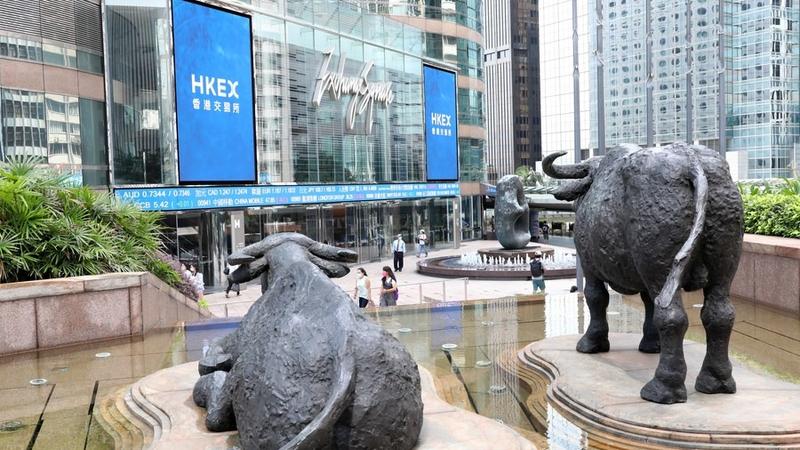 This file photo dated July 31, 2021 shows the statues on the square of Hong Kong Exchanges and Clearing Limited (HKEX) in south China's Hong Kong. (PHOTO / XINHUA)
This file photo dated July 31, 2021 shows the statues on the square of Hong Kong Exchanges and Clearing Limited (HKEX) in south China's Hong Kong. (PHOTO / XINHUA)
The Legislative Council on Wednesday passed a bill to reduce the stamp duty on stock trading to 0.1 percent from 0.13 percent starting from Nov 17.
“The reduction of the rate of the stamp duty will lower investors' transaction costs, improve market sentiment, and enhance the competitiveness of Hong Kong's stock market,” a government spokesman said.
In optimizing the listing regime, the bourse operator has completed a public consultation on specific proposals for reforming the Growth Enterprise Market (GEM)
“The government will work with financial regulators and the Hong Kong Exchanges and Clearing Limited (HKEX) to follow up on the other measures recommended by the Task Force on Enhancing Stock Market Liquidity to promote the sustainable development of the market,” the spokesman added.
READ MORE: Financial chief: Stamp duty cut could be counterproductive
The stamp duty cut is among a package of measures announced by the Hong Kong government to bolster the city’s sagging equities market. The Hang Seng Index has retreated by more than 10 percent this year, while average daily turnover shrank 16 percent year-on-year to HK$115.5 billion ($14.79 billion) in the first six months.
According to Secretary for Financial Services and the Treasury Christopher Hui Ching-yu, HKEX is reviewing stock trading spread and considering a cut in market data fees in an effort to help investors lower costs.
In optimizing the listing regime, the bourse operator has completed a public consultation on specific proposals for reforming the Growth Enterprise Market (GEM), Hui said. It has proposed the introduction of a new transfer board mechanism and the establishment of a new listing channel for research-based companies.
As mentioned by Financial Secretary Paul Chan Mo-po in his budget this year, the HKEX is exploring arrangements for maintaining market operations during severe weather, so as to facilitate investors' transactions and meet market development needs.
Hui said HKEX will continue to promote the advantages of the Hong Kong stock market to developed and emerging markets, particularly in the Middle East and in Association of Southeast Asian Nations (ASEAN) countries.
Efforts will be made to attract investors from various regions to utilize Hong Kong's investment and financing platform for asset allocation, Hui said. In this regard, the government and regulatory bodies will support HKEX’s plan to expedite the establishment of offices in the Middle East to enhance the promotion of Hong Kong's financial infrastructure and product ecosystem to local investors.
“Our efforts to enhance the competitiveness of the stock market will not be limited to short-term measures,” Hui told lawmakers on Wednesday.
READ MORE: Experts: Stamp duty tweak's impact on market only 'limited'
“The Financial Services and the Treasury Bureau will further seek valuable input from members and coordinate with regulatory bodies and HKEX to continuously adjust Hong Kong's market positioning. Forward-looking planning will be undertaken to further drive the continuous development of the Hong Kong stock market and enhance and consolidate Hong Kong's status as an international financial center,” Hui said.


